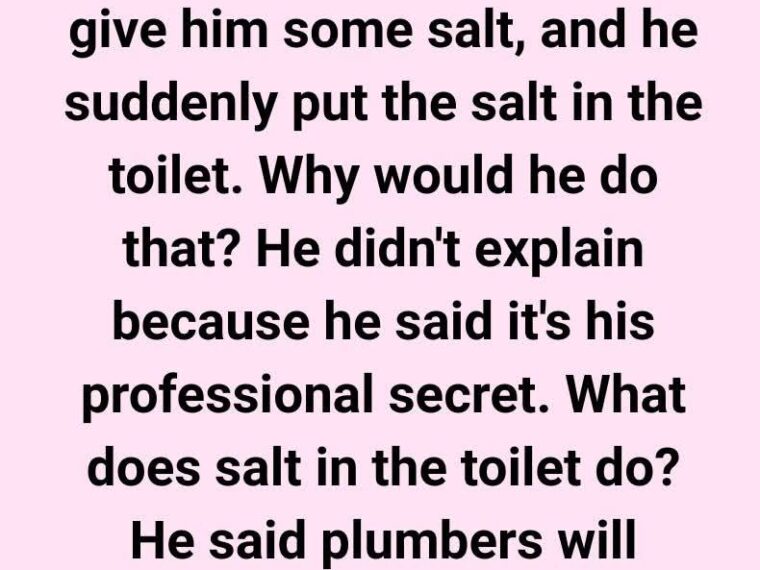Every homeowner knows that plumbing problems are an inevitable part of home maintenance. Some issues are minor and easily fixed, while others can be serious and costly, especially when it comes to your toilet. One common problem many people face is noticing that their toilet flushes slowly, makes strange gurgling sounds, or even emits unpleasant odors. These issues can be annoying and disruptive — but did you know there’s a simple, little-known remedy that many plumbers recommend involving just one common household ingredient?
The answer might surprise you: salt. Yes, that same salt you use for seasoning your food can be a powerful tool in your home plumbing arsenal.
The Root of the Problem: Tree Roots and Your Pipes
Before we get into how salt can help, it’s important to understand what’s causing the problem in the first place. Over time, the roots of trees and bushes planted near your home can grow towards your plumbing pipes underground. Why? Because roots naturally seek out water sources, and your sewer or drainage pipes are full of moisture.
As these roots grow, they can poke small holes or cracks in your pipes to continue spreading. This intrusion can cause blockages, leaks, and slow drainage, leading to all the frustrating symptoms you might have noticed: slow flushing toilets, gurgling sounds, bad smells, or even sewage backups.
If left unchecked, root intrusion can cause extensive damage, sometimes requiring expensive repairs or even full replacement of sewer lines — a daunting and costly project.
The Salt Solution: How Does It Work?
Plumbers and savvy homeowners alike have discovered a simple preventative measure: pouring rock salt down the toilet.
Here’s why it works: Rock salt, also known as coarse salt, has natural properties that can help kill or deter the growth of roots inside your pipes. When you pour a cup or so of rock salt into your toilet and flush, the salt travels through the plumbing system, reaching the roots invading your pipes. The salt’s dehydrating effect damages the roots, preventing them from growing further and worsening the damage.
Think of salt as a natural root-killer that can help stop the problem before it escalates. It’s a chemical-free, inexpensive, and easy-to-apply solution — something many plumbers recommend as a first step before calling in professionals.
How to Use Salt in Your Toilet Correctly
If you want to try this at home, here’s a step-by-step guide to using salt to keep your pipes clear:
- Purchase Rock Salt: Look for rock salt or coarse salt at your local hardware store or garden center. Avoid table salt or iodized salt, which dissolve too quickly and won’t have the desired effect.
- Pour the Salt Into the Toilet Bowl: Add about 1 cup of rock salt directly into your toilet bowl.
- Let it Sit: Ideally, let the salt sit in the toilet bowl for at least a few hours or overnight to maximize its effect on the roots.
- Flush: After the waiting period, flush the toilet once or twice to send the salt down the pipes.
- Repeat Regularly: For ongoing prevention, repeat this process every month or so, especially if you live in an area with many trees or have experienced root intrusion before.
When Salt Is Not Enough: Knowing When to Call a Professional
While salt can be very effective for minor root problems or as a preventative measure, it’s not a guaranteed fix for all plumbing issues. If your toilet continues to drain slowly, gurgle, or emit bad odors even after using salt, it might be time to call a professional plumber.
Plumbers have specialized tools like pipe cameras that can inspect the inside of your pipes to identify the exact problem. They also have equipment like hydro-jetters to blast roots and debris out of pipes or may recommend more extensive repairs if the damage is severe.
Ignoring persistent problems can lead to bigger headaches, including sewage backups inside your home, property damage, and costly emergency repairs.
Additional Tips for Maintaining Healthy Pipes
Besides using salt, there are several other ways to keep your plumbing system in good shape and avoid root-related problems:
- Be mindful of what you flush: Avoid flushing items that can clog pipes, such as wipes, feminine hygiene products, or grease.
- Plant trees strategically: If you’re planting new trees or shrubs, keep them away from sewer lines whenever possible. Consult with an arborist or landscaper for advice on root-safe plants.
- Use drain screens: These can catch hair and debris before they enter your pipes.
- Schedule regular inspections: Having your plumbing inspected periodically by a professional can catch small issues before they become big problems.
Other Natural Remedies to Consider
In addition to salt, some homeowners also use vinegar and baking soda to clean drains and help prevent buildup. This combination creates a fizzy reaction that can loosen grime and clear minor blockages. However, vinegar and baking soda won’t affect root growth like salt can.
Why Salt Is a Smart Choice
The best part about using salt is that it’s a natural, chemical-free method. Many commercial root killers contain harsh chemicals that can be harmful to the environment, pets, and even your plumbing system over time. Salt is a safer alternative that’s gentle on your pipes while still effective against root intrusion.
Conclusion
Toilets and plumbing may not be the most glamorous topic, but keeping your system running smoothly is crucial for a happy, healthy home. If you notice slow draining, gurgling sounds, or funky smells coming from your toilet, don’t ignore the signs. Try the salt trick as a simple, inexpensive, and natural first step to combat root intrusion before the problem gets worse.
If the salt doesn’t do the trick, don’t hesitate to call a trusted plumber to assess and fix the issue professionally. Preventative care and early intervention can save you time, money, and stress in the long run.
So next time your toilet acts up, remember this little-known plumbing hack — and keep that rock salt handy!





